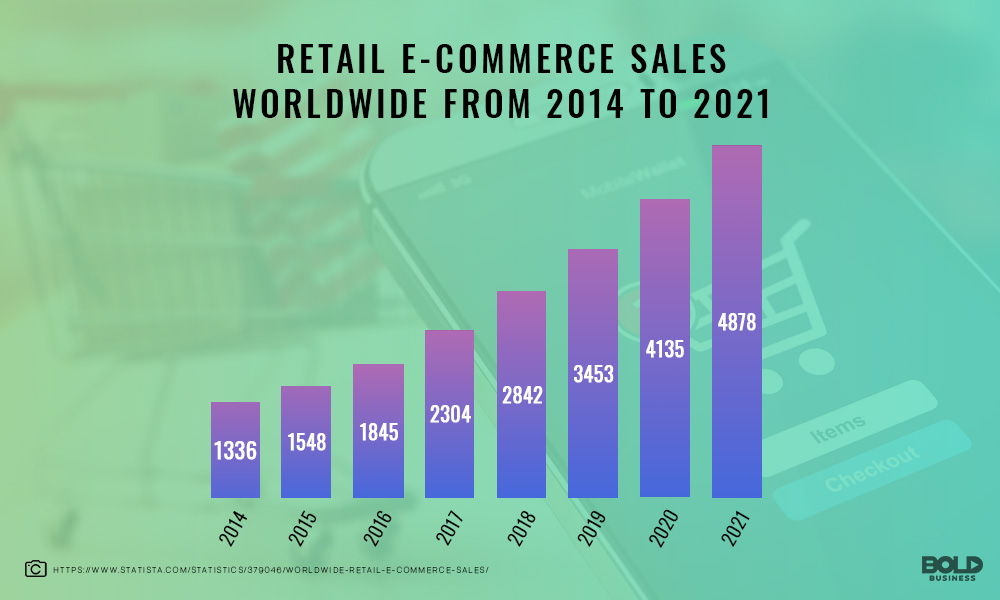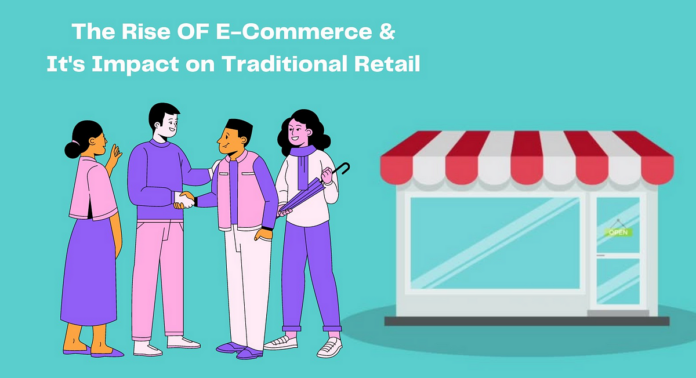Introduction: The Changing Landscape of Retail
In recent years, the rise of e-commerce has revolutionized the way consumers shop, reshaping the retail industry as a whole. The Impact of E-commerce on Traditional Retail Business has been profound and continues to evolve rapidly. This article explores the various ways in which e-commerce has transformed traditional retail, the challenges it poses, and the opportunities it presents. Let’s delve into the world of digital shopping and its effects on the brick-and-mortar retail model.
The Growth of E-commerce and its Effects on Traditional Retail
E-commerce has experienced explosive growth over the past decade, driven by technological advancements, convenience, and changing consumer preferences. The Impact of E-commerce on Traditional Retail Business is evident in multiple areas:
1. Digital Consumer Behavior: How Shopping Habits Have Changed
LSI Keywords: Online Shopping, Consumer Trends, Digital Shopping Behavior
With the advent of e-commerce, consumers have shifted towards online shopping, preferring the ease of browsing products, comparing prices, and making purchases from the comfort of their homes. The Impact of E-commerce on Traditional Retail Business lies in understanding these digital shopping behaviors, such as showrooming and webrooming, where consumers research products in-store but buy them online, or vice versa.

2. Omni-Channel Retailing: Bridging the Gap
LSI Keywords: Integrated Retail, Seamless Shopping Experience
To adapt to the changing landscape, many traditional retailers have embraced omni-channel strategies. These approaches aim to offer a seamless shopping experience across various channels, including online platforms and physical stores. The Impact of E-commerce on Traditional Retail Business can be seen in the integration of online and offline shopping, enabling retailers to reach a broader audience and enhance customer engagement.
3. Impact on Brick-and-Mortar Stores: Challenges and Opportunities
LSI Keywords: In-Store Experience, Footfall, Physical Retail Transformation
While e-commerce has presented challenges to brick-and-mortar stores, it has also opened up new opportunities. Retailers must focus on providing unique in-store experiences, personalized services, and innovative products to attract and retain customers. The Impact of E-commerce on Traditional Retail Business necessitates a reimagining of physical retail spaces to remain competitive.
4. Logistics and Supply Chain: Streamlining Operations
LSI Keywords: Fulfillment, Last-Mile Delivery, Supply Chain Efficiency
E-commerce has reshaped logistics and supply chain management. Retailers must now ensure efficient order fulfillment and timely last-mile delivery to meet customer expectations. The Impact of E-commerce on Traditional Retail Business can be seen in the growing importance of supply chain optimization and delivery speed to maintain a competitive edge.
5. Impact on Employment: Changing Retail Job Landscape
LSI Keywords: Retail Employment, Job Displacement, E-commerce Workforce
The transition to e-commerce has had repercussions on traditional retail jobs. While it has created new roles in digital marketing, data analytics, and e-commerce operations, it has also led to the displacement of certain traditional retail positions. The Impact of E-commerce on Traditional Retail Business extends to the need for upskilling and reskilling the workforce to adapt to the changing demands of the industry.
6. Market Expansion: Reaching Global Audiences
LSI Keywords: Global E-commerce, International Markets, Cross-Border Sales
One of the most significant impacts of e-commerce on traditional retail is the ability to reach global audiences. Online platforms enable retailers to expand their market presence beyond geographical boundaries and cater to international customers. The Impact of E-commerce on Traditional Retail Business can be seen in the rise of cross-border sales and the need for retailers to understand diverse cultural and regulatory landscapes.
Challenges Faced by Traditional Retailers in the E-commerce Era
7. Intense Competition: Surviving in a Digital Marketplace
LSI Keywords: E-commerce Competition, Market Saturation, Competitive Advantage
In the highly competitive e-commerce landscape, traditional retailers face challenges in establishing a unique selling proposition and standing out from the crowd. The Impact of E-commerce on Traditional Retail Business necessitates the development of innovative marketing strategies and a deep understanding of consumer preferences to gain a competitive advantage.
8. Digital Marketing and Branding: Embracing Online Presence
LSI Keywords: Online Branding, Digital Advertising, E-commerce Visibility
Creating a strong online presence is crucial for traditional retailers to compete effectively in the digital age. Successful branding and digital marketing strategies are vital to attract and retain customers. The Impact of E-commerce on Traditional Retail Business is evident in the need for retailers to leverage social media, content marketing, and search engine optimization (SEO) to enhance their visibility and engage with their target audience.
9. Cybersecurity and Data Privacy: Protecting Customer Information
LSI Keywords: E-commerce Security, Data Breaches, Consumer Trust
With the increase in online transactions, the security of customer data has become a top priority for retailers. Cybersecurity threats and data breaches can severely impact consumer trust and reputation. The Impact of E-commerce on Traditional Retail Business highlights the importance of robust data protection measures and transparent privacy policies.
10. Adaptation to Technological Advancements: Staying Ahead
LSI Keywords: Retail Innovation, Technological Integration, Digital Transformation
To remain competitive, traditional retailers must embrace technological advancements and innovation. This includes adopting cutting-edge retail technologies, such as augmented reality (AR) for virtual try-ons or artificial intelligence (AI) for personalized product recommendations. The Impact of E-commerce on Traditional Retail Business requires retailers to stay agile and continuously evolve with changing technology trends.
11. Balancing Online and Offline Strategies: The Hybrid Approach
LSI Keywords: Blended Retail Model, Bricks-and-Clicks, Offline-to-Online Transition
A successful retail strategy in the e-commerce era involves striking the right balance between online and offline channels. The Impact of E-commerce on Traditional Retail Business calls for the adoption of a hybrid approach that leverages the strengths of both online and brick-and-mortar retail to cater to diverse customer preferences.
The Future of Retail: Opportunities and Projections
12. Personalization and Customer Experience: Driving Loyalty
LSI Keywords: Customer Retention, Tailored Shopping, Hyper-Personalization
The future of retail lies in hyper-personalization, where retailers use data analytics and AI to provide highly tailored shopping experiences. The Impact of E-commerce on Traditional Retail Business includes the potential to foster customer loyalty through personalized recommendations, curated product assortments, and individualized offers.
13. Augmented Reality and Virtual Reality: Transforming Shopping
LSI Keywords: AR Shopping, VR Retail, Immersive Customer Experience
The integration of augmented reality (AR) and virtual reality (VR) in retail is set to revolutionize the way consumers shop. These technologies offer immersive experiences, allowing customers to virtually try on products and visualize them in real-world settings. The Impact of E-commerce on Traditional Retail Business is likely to include a significant shift towards AR and VR applications to enhance the shopping experience.
14. Sustainable and Ethical Practices: Meeting Consumer Demands
LSI Keywords: Eco-Friendly Retail, Ethical Consumerism, Social Responsibility
As consumers become more environmentally conscious, retailers must align with sustainable and ethical practices. The Impact of E-commerce on Traditional Retail Business entails adopting eco-friendly packaging, supporting fair trade initiatives, and transparently communicating ethical sourcing practices to gain consumer trust.
15. Drones and Autonomous Delivery: The Future of Fulfillment
LSI Keywords: Drone Delivery, Autonomous Vehicles, Contactless Fulfillment
The utilization of drones and autonomous vehicles for last-mile delivery promises faster, more efficient, and contactless fulfillment. The Impact of E-commerce on Traditional Retail Business includes the potential to transform delivery logistics, reduce costs, and improve the overall customer experience.
16. Integration of Online and Offline: Blurring Boundaries
LSI Keywords: Seamless Shopping, Convergence, Phygital Retail
The future of retail is likely to witness an even more seamless integration of online and offline channels. The Impact of E-commerce on Traditional Retail Business involves breaking down the barriers between physical and digital shopping, creating a cohesive and immersive retail experience for consumers.
17. Artificial Intelligence in Retail: Personal Assistants
LSI Keywords: AI Chatbots, Virtual Shopping Assistants, AI Retail Solutions
Artificial intelligence will play a central role in the future of retail, offering virtual shopping assistants that can interact with customers, understand their preferences, and provide personalized recommendations. The Impact of E-commerce on Traditional Retail Business will include an increasing reliance on AI-powered solutions to enhance customer service and optimize retail operations.
FAQs about The Impact of E-commerce on Traditional Retail Business
1. How has e-commerce impacted traditional retail businesses?
E-commerce has transformed traditional retail by changing consumer behavior, reshaping supply chains, and necessitating innovative marketing strategies to remain competitive.
2. What challenges do traditional retailers face in the e-commerce era?
Traditional retailers face challenges such as intense competition, the need for digital marketing expertise, cybersecurity threats, and the necessity to adapt to technological advancements.
3. How can traditional retailers embrace e-commerce and online presence effectively?
Traditional retailers can embrace e-commerce by developing a strong online brand, leveraging social media and SEO, and adopting omni-channel strategies to provide a seamless shopping experience.
4. What opportunities does the future of retail hold?
The future of retail presents opportunities in personalized shopping experiences, augmented reality integration, sustainable practices, autonomous delivery, and AI-powered customer service.
5. How can retailers balance online and offline strategies effectively?
Retailers can strike a balance between online and offline strategies by adopting a hybrid approach that caters to the preferences of diverse customer segments.
6. What role does artificial intelligence play in the future of retail?
Artificial intelligence will serve as a key component in the future of retail, offering virtual shopping assistants and enhancing customer service through personalized recommendations.
Conclusion: Embracing the Digital Transformation
The Impact of E-commerce on Traditional Retail Business has been profound, reshaping the retail landscape and forcing retailers to adapt to changing consumer behaviors and preferences. By understanding and embracing e-commerce, traditional retailers can seize the opportunities presented by the digital revolution and stay relevant in an increasingly competitive market. The future of retail is an exciting fusion of technology, innovation, and personalized experiences, where the boundaries between online and offline shopping are blurred, and customer satisfaction reigns supreme.
============================================


